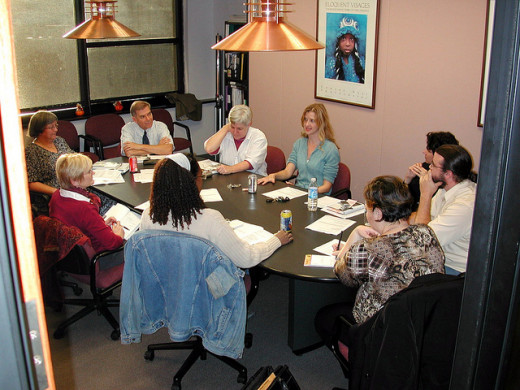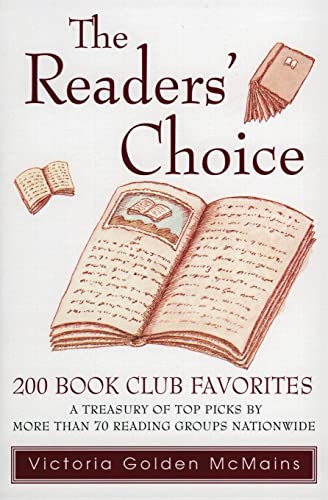How to Start a Book Club or Reading Group


Meeting Places for Reading Groups
Where you decide to meet is key to understanding just how many people you want in your book club or reading group. Oprah.com suggests inviting only eight or less members if you plan to meet at your house and twelve or more if you find a meeting place somewhere else (for example, your local library or coffee shop).
Starting Book Groups
It seems simple enough at first to suddenly decide to start a book club of some sort on your own but when it really comes down to it, knowing just where to begin may be the hardest part. Your own book group may meet in person or connect online, it's all up to you. Reading groups come in all shapes and sizes with different backgrounds and interests. Choosing just where to start a book club or reading group is also your way of defining what your group is about. Do you all love romance? Do you want to read books that have movie adaptations you can all watch together after reading? It is essential that you decide on these basics first before you begin planning your first book club meeting.
Don't be afraid. It may seem like a daunting task, but, once you get the basics down, starting a book club or reading group can be really fun. Here are a few questions to help get you started to help you understand how to start a book club or reading group:
- Why are you starting this reading group? What are you hoping to get out of it?
- What kinds of people do you hope to have in your club? Will they all have something in common or be completely different from each other?
- What types of books will you read? Will they all fall under the same genre or vary?
- How many members will you have?
- When will you hold your first meeting? Where? How often will you meet afterwards?


Online Book Clubs
The advantage of book clubs online is that there is no place or time set for meetings. If you don't want the stress of organizing meetings and creating book lists, this may be the best type of reading group for you. Beware, some members may read at different speeds than others so the real exciting parts may be revealed before you get to them. Keeping up with the reading and making sure everyone is at the same pace is key.
Book Suggestions: How to Create a Reading List
Of course, one of the very most important parts of starting a book club or reading group is creating a reading list. Book suggestions from friends, especially if they are going to be a part of the book club or reading group, can be really helpful. Knowing the focus of your book club and the type of members you would like is a big help for creating a list of books to read or at least coming up with a book to get started with. For example, if you're all romance novel fanatics, then go out there and find the current best selling romance novel or a new one by one of your favorite authors. If you like books with movie adaptations, start off with one that was just made into a movie recently.
If you don't already have a book or two in mind to get your club started, or perhaps you do but you would love to have a little longer reading list, then asking each member to bring their own list to the first meeting may help. This way, you get a variety of books, some of which you may not have ever heard of, to choose from. It also brings the group together right from the start as you all choose what books to delve into as a team for each of your meetings from then on.
There are many book lists out there to choose from. Whether they are online or in a book like the one shown to the right, the most important thing to understand when researching how to start a book club or reading group is how to get that reading list started. Without knowing what you are going to read, your book club or reading group may not get started at all.

Book Discussion Questions
Here are a few examples of some book discussion questions to help you get started or to keep in mind if things slow down at any of your meetings:
- What did you think the book was about?
- Was it disappointing? Did you enjoy it?
- Were the characters realistic? Would you ever meet them in person if you could? Have you ever known someone similar?
- Did the character's actions seem realistic? Why or why not?
- Would you have made the same decision as one or more of the characters? Why or why not?
- What are some of the themes of the book?
Book Discussion Tips
- How to Lead a Book Club Discussion - Guide to Leading Discussions with Your Book Club or Class
Find out how to promote conversation about a book and lead your book club discussion group with ease.
Keeping the Discussion Going
Ending the discussion with yet another question to keep in mind or an idea may help to keep your members thinking even after they leave the meeting and may hep tie in this discussion to the next one you all will have.
How to Start and Lead a Book Discussion
If you've already all decided on your first book, give your members a couple of weeks notice before the first meeting for your book club or reading group. This way, they can read a chapter or two of the book before the meeting takes place. Also ask them to bring at least one discussion question with them to the meeting.
If you haven't all already decided on the first book, that's okay. Take the time at your meeting to vote on which book to start with and keep a list of the others. Starting a book club or reading group isn't easy but, as long as you make it a team effort, you are guaranteed success, no matter how long it takes just to get that first decision on what book you all would like to read together.
Be prepared for more than just a book discussion for your meeting for your book club or reading group because you and your members will still have to smooth out a few things to really get this book group started. Here are a few questions to keep in mind:
- Who will lead the meetings? Will it be the same person every time or the person who suggested the book?
- Will there be a price limit for your reading list?
- Who will keep track of the books read, when they were discussed, etc.?
- Where will meetings be held? Will the all be in the same place or different each time?
- Will refreshments be provided? Who will be in charge of them?
It may be tempting to start off the first meeting with your book discussion but hold off until these important questions (as well as whatever other ones you may come up with on your own) are answered. Then, go into your discussion with the leader (who may be you) sharing their question first and then going on to each member's questions in turn.
Remember that not all questions may be that interesting or bring about much discussion in the book club or reading group so it's alright to breeze over a few. On the other hand, questions may bring out a lot of discussion and can take up the entire meeting. If that happens, don't it off for the sake of making sure you all answer every question. You won't always get to every question everyone has and that's alright as long as everyone is participating and having fun.
© 2012 Lisa











